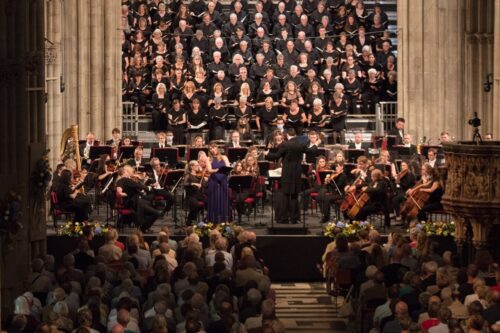
 United Kingdom Copland, Beethoven, Vaughan Williams, Elgar – Three Choirs Festival 2021 [1]: Marta Fontanals-Simmons (mezzo-soprano), Tom Mole (baritone), Three Choirs Festival Chorus, Philharmonia Orchestra / Samuel Hudson (conductor). Worcester Cathedral, 24.7.2021. (JQ)
United Kingdom Copland, Beethoven, Vaughan Williams, Elgar – Three Choirs Festival 2021 [1]: Marta Fontanals-Simmons (mezzo-soprano), Tom Mole (baritone), Three Choirs Festival Chorus, Philharmonia Orchestra / Samuel Hudson (conductor). Worcester Cathedral, 24.7.2021. (JQ)

Copland – Fanfare for the Common Man
Beethoven – Meeresstille und glückliche Fahrt
Vaughan Williams – Songs of Travel
Elgar – The Music Makers
It is always exciting to attend the first night concert of a Three Choirs Festival. There is a buzz in the air and the prospect of a week of intensive music-making that is like no other I know. Tonight, even though natural nervousness among some of the population meant there were empty seats as opposed to the usual full house, the atmosphere was almost tangible. There had been no Three Choirs Festival at all in 2020 due to the Covid emergency and the run-up to the 2021 Festival was fraught with uncertainty, especially over whether or not choral concerts, the backbone of any Three Choirs Festival, would be permitted. In the end, the government’s relaxation of social distancing restrictions in England just six days ago gave the green light.
I imagine that few of my fellow audience members had been present at a live concert in a very long time. I last attended a concert on 4 March 2020, when I heard a City of Birmingham Symphony Orchestra concert – which included the CBSO Chorus singing the Brahms Requiem – in Symphony Hall. In the intervening months, orchestras and small vocal ensembles grew ever more adaptable and proficient in presenting streamed concerts, and some of those sustained me. But performances by a full choir had been out of the question. So, it was an even greater pleasure than usual to see some 130 members of the Three Choirs Festival Chorus take their place on the staging in Worcester Cathedral.
When I interviewed him recently Samuel Hudson told me that the inclusion of The Music Makers had been planned long before anyone had so much as heard of Covid-19. Nonetheless, after what has seemed like an interminable, bleak winter for singers everywhere, it was very appropriate that tonight the Festival Chorus was to sing a work which opens with the words ‘We are the music makers / And we are the dreamers of dreams’.
After the Dean of Worcester’s welcome, the musical proceedings started with a bang – literally. The huge percussion crash which opens Copland’s Fanfare for the Common Man visibly startled some in the audience. It is an uplifting, aspirational piece – just right in the circumstances – and the brass and percussion players of the Philharmonia delivered an imposing account of it.
Many years ago, I sang in a performance of Beethoven’s short choral cantata, Meeresstille und glückliche Fahrt. I have virtually no recollection of it now, save that in the second, ‘Prosperous Voyage’ part we seemed to sing the word ‘Geschwinde!’ (‘Make haste!’) an awful lot. Perhaps I can’t remember much about the piece because, in truth, it’s a very long way from being top-drawer Beethoven. The work is a conflation of two Goethe poems. The first part, which depicts the calm sea, is marginally the more interesting of the two. I thought that the Festival Chorus evidenced good balance and discipline in this music. In the fast, ‘Prosperous Voyage’ section Samuel Hudson injected vitality into the music; his singers and players responded with alacrity.
Vaughan Williams’ cycle of Robert Louis Stevenson settings, Songs of Travel is a staple of the English song repertoire though the songs are usually heard in their original version with piano accompaniment. The orchestral version is much rarer; indeed, though I have heard several recorded performances, I think this was the first time I had heard the orchestral version performed live. The songs were composed between 1901 and 1904, though only the first eight were published – or performed – in VW’s lifetime. For some reason, he withheld the final song, ‘I have trod the upward and the downward slope’; it was discovered among his papers after his death and published. I have never understood why that song was kept hidden because both the words and the thematic cross-references bring the cycle to a very satisfying end; I can’t envisage hearing the cycle without it. VW orchestrated three of the songs himself in 1905: ‘The Vagabond’, ‘The Roadside Fire’ and ‘Bright is the Ring of Words’. The other songs were orchestrated by the composer’s assistant, Roy Douglas at the request of the publishers Boosey & Hawkes. That was in 1962, by which time the ninth song, ‘I Have Trod the Upward and the Downward Slope’ was in the public domain, so Douglas was able to score that song also. Douglas said that he used the same forces as VW had used for his own orchestrations but he also kept in his mind how the composer might have scored the others by the end of his life. The results seem very convincing to me.
The Festival welcomed the young British baritone Tom Mole to sing them. I don’t recall hearing him previously but that’s no surprise. Mole is a young singer (born in 1997) who is just starting his professional career. He has an auspicious pedigree, though; he is an alumnus of the Guildhall School of Music and Drama where, earlier this year, he was awarded the prestigious Gold Medal. On the basis of what we heard tonight; an important career lies ahead of him.
Right from the start Mole made an excellent impression. In ‘The Vagabond’ he exhibited a full, firm tone and excellent diction. These characteristics were in evidence throughout the cycle, as was the evenness with which he produced his voice throughout its compass. I suspect that had he been singing these songs in the recital room, rather than projecting down the long cathedral nave and over a full orchestra, he might have needed to take fewer breaths. That occasionally compromised the line but, in this context, I felt that was a small price to pay for the pleasure of hearing so fine a voice produced so well. Tom Mole was also very alive to the poetry of both words and music, as we experienced, for example, in ‘Let Beauty awake’. He was very expessive in ‘Youth and Love’ and I liked the forthright beginning to ‘Bright is the ring of words’, after which he relaxed into warm lyricism, as the music demands. There were a few occasions when he attempted, very properly, soft dynamics which would have worked extremely well with piano but which, on this occasion, were rather vitiated by the orchestral volume. In fact, if I have a criticism of the performance, it would be that at times the Philharmonia didn’t quite match the soloist’s sensitivity, especially in the matter of dynamics. However, the performance belonged to Tom Mole who thoroughly deserved the vociferous applause he received. I hope to hear hm again soon; I would like to encounter him in VW’s mighty Sea Symphony.
The second half brought us music by another quintessential Three Choirs composer, Elgar. It also brought us another young soloist who I had not heard before, the Spanish-British mezzo Marta Fontanals-Simmons.
The Music Makers (1912) is a unique work in Elgar’s output. Peppered with self-quotations, the score has some passages of brilliant choral and/or orchestral writing but cheek by jowl with these are many episodes of introspection and melancholy. Coming not long after his great Second Symphony (1910) it shows Elgar at the height of his powers as an inventive writer for the modern symphony orchestra; the scoring is masterly, full of colour and incident. I have had the good fortune to sing this work several times and it seems to me that the choral writing in Music Makers is especially challenging among Elgar’s choral works, not least in the requirement for pin-point rhythmic accuracy in many places. Fortunately, this is music which is in the very DNA of the Festival Chorus, so Elgar’s music was in good hands. For his text, Elgar chose a poem by Alfred O’Shaughnessy (1844-1881). Candidly, it would be a kindness to say that the poem is of its time, yet it clearly struck a chord with Elgar.
In the extended orchestral introduction Samuel Hudson very rightly injected urgency into the music. In fact, urgency was often a hallmark of this performance. When I’ve sung the work, I have always thought that the choral writing in the passage beginning ‘And therefore today is thrilling’ is less than convincing. However, Mr Hudson made this episode very exciting, helped by a highly committed response from his choir. Elsewhere, I thought there were occasions when I would have liked him to give the music just a bit more space so as to bring out even more the poetry. That said, I admired the interpretation overall. The choir sang with great conviction. My only criticism would be that I would have liked even more in the way of soft dynamics; the very first entry, for example, was admirably focused but wasn’t sufficiently quiet and as a result the air of mystery wasn’t quite achieved.
As I said, I have not heard Marta Fontanals-Simmons before, but I was seriously impressed. Here is a singer whose tone is firm and very well-focused. She used vibrato intelligently to warm the tone, but the vibrato was never excessive – praise be! – and so she achieved admirable clarity both in the music and the words. At the words ‘But on one man’s soul it hath broken’, Elgar movingly quotes ‘Nimrod’ from the Enigma Variations, undoubtedly recalling his great friend August Jaeger, who had died in 1909. It’s a truly touching moment and the simplicity with which Ms Fontanals-Simmons sang at this point was just right. She was excellent in the passage that followed. Later in the work, the soloist’s grand outburst at ‘Great hail!’ was thrillingly done, after which she led the passage beginning ‘Bring us hither’ eloquently. The most memorable moment in Music Makers occurs at ‘Yea, in spite of a dreamer who slumbers, / And a singer who sings no more’. Marta Fontanals-Simmons waited just long enough to make a telling silence and then sang the word ‘Yea’ with simple eloquence. Elgar then tugs at our heart strings by quoting ‘Novissima hora est’ from The Dream of Gerontius. Here, Ms Fontanals-Simmons, sensitively supported by Samuel Hudson, made the music memorable without any excess of emotion. I am not ashamed to admit that my eyes prickled at this point.
So, this was a marvellous performance by Marta Fontanals-Simmons and the Festival Chorus made a fine contribution. If you can sense a ‘but’, I’m afraid I have to say that quite often the orchestra was too loud. I suspect that the players may not have performed this music very often before and it must be a challenge to get to grips with the cathedral’s resonant acoustic on limited rehearsal time. However, my guest commented that she found the orchestra sound wearing to listen to and I sympathise with that view. Elgar’s score abounds in rich, colourful and inviting orchestral writing but more light and shade would have been welcome. I am sure things will settle down as the week unfolds.
Just staging this concert in the face of Covid restrictions was a triumph of organisation, musicianship and sheer will power. It was simply thrilling to see and hear live music making again. The request to wear a face mask – which I noticed many of my fellow audience members did not heed – was a small price to pay to be present as the Three Choirs Festival 2021 was well and truly launched.
John Quinn
For more about the Three Choirs Festival 2021 click here.
